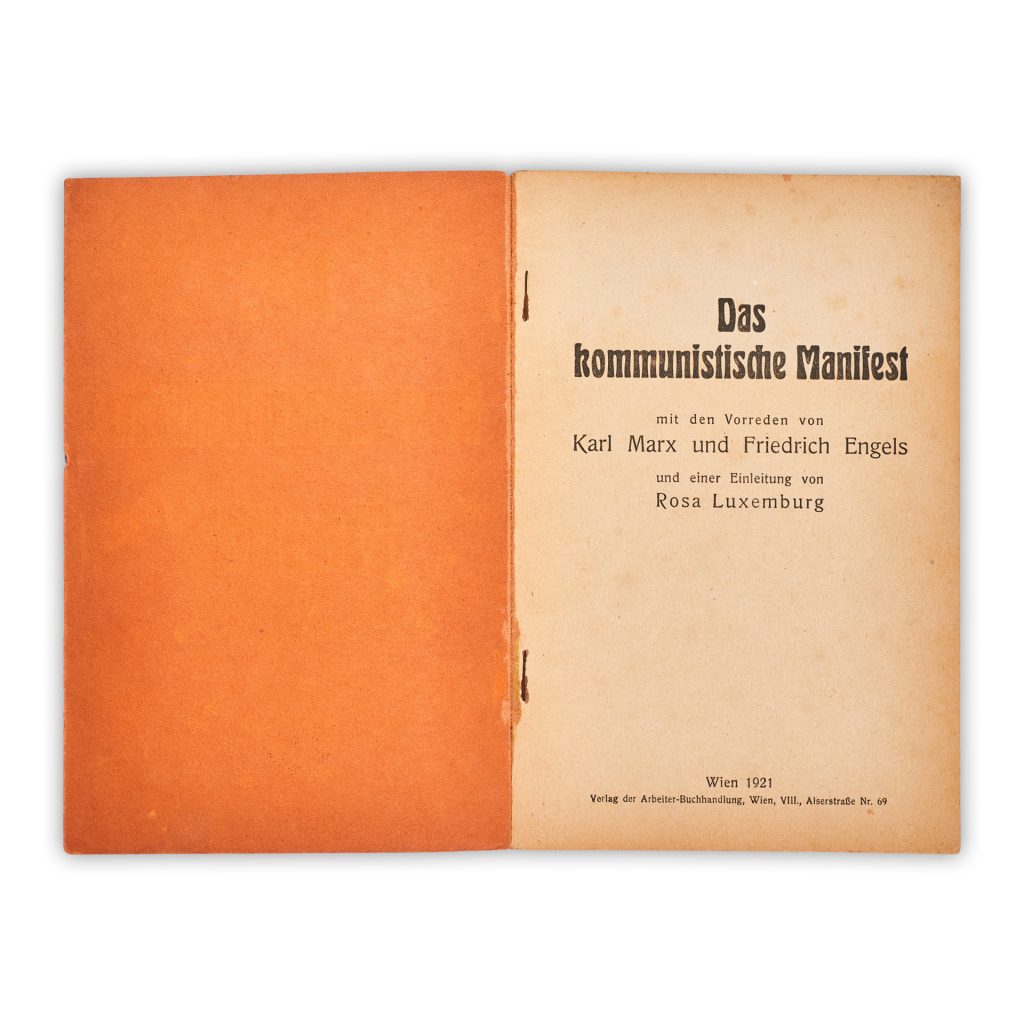The Communist Manifesto Vienna, Austria, 1921 Museum Collection
The founding text of communism has been translated into dozens of languages and has had a profound impact on the communist movement worldwide. This edition includes a preface by Rosa Luxemburg – a Polish-German Jewish Marxist, feminist, and revolutionist.
Must Know
Karl Marx was a socialist, economist, journalist and one of the most influential philosophers of the modern world. he wrote numerous essays and books, some of them with his partner, Friedrich engels. The most well-known and influential essay is the Communist Manifesto, written in 1848. here Marx strove for social and class equality, claiming that there is a perpetual class war between the upper class and the enslaved lower class, and that nationalism, including religious affiliation, should be abolished and a society without class and private property should be created.
Marx came from a Jewish family; his grandfather was the community rabbi in Trier and his father was a business lawyer. However, after the city was passed to German control, the rights of Jewish residents were weakened, and his father converted to Christianity. After a few years the rest of the family also converted to Christianity, although the family continued to be a part of the city’s Jewish community. Marx was greatly influenced by the inequality created on the basis of religion and this contributed to his negative view regarding the impacts of the Industrial Revolution in large cities. These views led to the promotion of the idea that political and social emancipation produces class equality regardless of nationality and religion and allows for a dignified life for all those of working class. Karl Marx, the father of the theory of socialism and communism and one of most influential people of modern society, was the originator of the concept of cancelling personal property.
Marx and engels were selected, together with other notable historical figures, to become characters for children in a series of historical figures produced by Playmobil. This is how the philosopher ended up as a personal property product, a game or collectible in a capitalist society, sold at an expensive price on Amazon.
More Info
Marx was born in 1818 to a Jewish family in Trier, a town in Germany which used to belong to France. In France, following the French Revolution, equal rights were given to the Jews. Marx’s father was a lawyer and his grandfather, Rabbi Shmuel Mordechai Halevi, was the rabbi of the Jewish community of Trier. However, administrative regulations required a name change for civilian purposes and the Levi family name evolved into the name Marx. In 1815 the Rhineland, in which Trier was situated, was annexed by Germany. In Germany equal rights were not granted to everyone and Jews were not able to engage in free trade. In order to resolve the issue, Germany allowed Jews to continue engaging in their trades with the condition that they converted to Christianity. Marx’s father, henrich Marx, converted to Protestantism (in a city where the majority were Catholic) and became a lawyer for the Jewish community. After a few years, his wife and children also converted, including six-year-old Karl Marx.
In Germany, he studied law and philosophy in Berlin and Bonn. he took an active part in various radical newspapers and was witness to the industrial revolution and its consequences: unregulated child labour, the movement of the rural masses to low-wage jobs in factories and the inability of workers to rise from the positions they were in. These, together with the change in his family’s rights and those of the Jewish community in Trier, rights which were taken away from them, increased the sense of injustice and radical inequality which Marx detailed in his writings. Following his participation in radical newspapers, Marx was deported from Germany, Austria and Belgium, and banned from living there, and settled in London, destitute. Two of his daughters passed away because he couldn’t afford to get medical help for them. Marx and his family were financially supported by Friedrich engels and others until his death.
Another important essay written by Marx was “On the Jewish Question”, in which Marx refers to European Jews in two ways: political emancipation and social emancipation. In referring to social emancipation, Marx claims that money is the top priority for Jews. Trade is important to them, and money is their secular religion. However, the first part of the essay calls for equal rights for the Jews. The provision of political emancipation produces full equal rights regardless of religion. There is speculation that Marx used antisemitic imagery purely as an example of the liberation of personal property, the Jews being known in Europe as merchants and bankers and being accused of stealing Christians’ money. On the other hand, there are arguments that Karl Marx was antisemitic.

